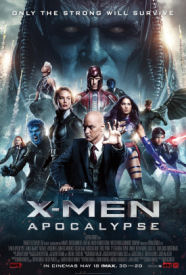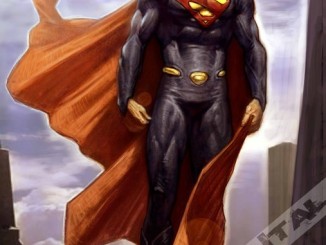 X Men: Apocalypse completes the trilogy of films that re-launches the X-Men franchise, resetting the timeline from what has come before and concludes with a team lineup drawn from the comic book’s fifty-plus year history. But like the quip that this film throws at the final (and significantly non-franchise founder Bryan Singer directed) installment of the original X-Men trilogy, “The third movies are always the worst.”
X Men: Apocalypse completes the trilogy of films that re-launches the X-Men franchise, resetting the timeline from what has come before and concludes with a team lineup drawn from the comic book’s fifty-plus year history. But like the quip that this film throws at the final (and significantly non-franchise founder Bryan Singer directed) installment of the original X-Men trilogy, “The third movies are always the worst.”
It has been a decade since the events of the last X-Men film, Days of Future Past, and in that time Charles Xavier (James McAvoy) has reopened his School for Gifted Children, i.e. mutants. Meanwhile Mystique (Jennifer Lawrence) has become a hero to mutants given her actions in trying to stop Erik Lehnsherr, aka Magneto (Michael Fassbender), from assassinating President Nixon. A seeming calm has developed in the relations between humans and mutants, at least in the United States. But a new threat has arisen in the form of Apocalypse (Oscar Issac), a powerful mutant from ancient Egypt who had been buried underneath a pyramid when he had been at his most vulnerable 5000 years ago. Gathering four acolytes at his side, Apocalypse sees Professor Xavier as the one mutant whose power can amplify his own in his quest to reshape the world in his own image. Mutants old and new must team together to stop Apocalypse and save Xavier.
Right from the beginning where the classic X-Men film title sequence is modified to show the span of centuries from Apocalypse’s entombment to the film’s setting of 1983, Bryan Singer promises us an X-Men film that may be a bit more epic than we have seen before. Unfortunately he never quite delivers on that promise. Sure Apocalypse’s destruction spans across the globe, but the film’s stakes never feel that high. The destruction shown is of such a large scale that, with the exception of one scene early on in which we see reactions to Apocalypse ridding the world’s nations of their nuclear arms, we don’t get any real idea of how people are being impacted by all the strum und drang.
Much of the film’s problems can be found in the screenplay’s handling of its large cast of characters. Singer does a lot of good here, but fumbles at a few key moments. Nearly all of the actors new to the franchise acquit themselves fairly well, which is a relief as will be most likely be seeing them for years to come. Sophie Turner especially handles well the demands the script makes on her character of Jean Grey, struggling with her fears of a power that she does not fully understand or control. Tye Sheridan does good work to as Scott Summers, especially considering that the visor his character wears to rein the otherwise uncontrollable lasers that shoot from his eyes robs him of that important actor’s tool. Olivia Munn is under served by the film’s screenplay which is a shame considering we recently seen how good an actress she can be in HBO’s The Newsroom. However considering the fact she is a self-professed comic book fan, one cannot fault her for wanting to jump at the chance to be in this movie.
 Singer once again returns to the idea that the superhero powers given to the X-Men are equal parts curse and blessing. For some, the outward mutations such as the growth of wings or blue skin makes it hard for them to move among society. But not everyone feels that same burden. In Days of Future Past, Singer gave us and iconic sequence showcase seeing the hero Quicksilver and his super-speed powers. Here singer reprises that sequence but instead of trying to one-up it in terms of action he ads a layer of humor to the scene, making it not only stand out on its own, but shows us how this particular hero views his powers.
Singer once again returns to the idea that the superhero powers given to the X-Men are equal parts curse and blessing. For some, the outward mutations such as the growth of wings or blue skin makes it hard for them to move among society. But not everyone feels that same burden. In Days of Future Past, Singer gave us and iconic sequence showcase seeing the hero Quicksilver and his super-speed powers. Here singer reprises that sequence but instead of trying to one-up it in terms of action he ads a layer of humor to the scene, making it not only stand out on its own, but shows us how this particular hero views his powers.
Where Singer fails his characters is the lack of attention that some of them receive. Fan favorite Nightcrawler is in the film, but only gets defined as a character in very broad strokes. The biggest weak point in terms of characterization is actually with the villain Apocalypse. Oscar Isaac is giving plenty of monologues but we still never get a true feeling as to what really motivates the villain to unleash the destruction he does outside of his belief in his own godhood. The only indication as to the source of these delusions is his ancient Egyptian background. But other than that, Apocalyspe comes off as a stock villain, another super-powered bad guy to be overcome by a group of teens struggling to learn what it is to be a team.
One other infuriatingly missed moment is the revelation of Erik’s belief in God. We know that as a child, he and his parents were shipped off to Auschwitz during the Holocaust, but we have never seen how that has impacted any spirituality the future Magneto may have held. The moment in the film comes as he holds is dying wife and child in his arms, looking up to heaven and screaming “Is this what you want of me?” It’s a powerful moment that reveals a new layer of the character which is never followed up on. Given that Apocalypse fashions himself as a god and recruits Magneto to his cause, there seems to be space there for that to be explored. Unfortunately Singer does not do so.
In total, X-Men: Apocalypse is not the worse entry in the franchise. (That title is still being battled for by X-Men 3 and X-Men: Origins – Wolverine.) And while it still has its good points, following such strong entries as director Matthew Vaughn’s First Class and his own Days Of Future Past, Singer’s latest installment comes as a bit of a let down.





Eucalyptus Paul Saylor liked this on Facebook.
Charlie Bee liked this on Facebook.
Brandin McCool liked this on Facebook.
Natasha Bogutzki liked this on Facebook.